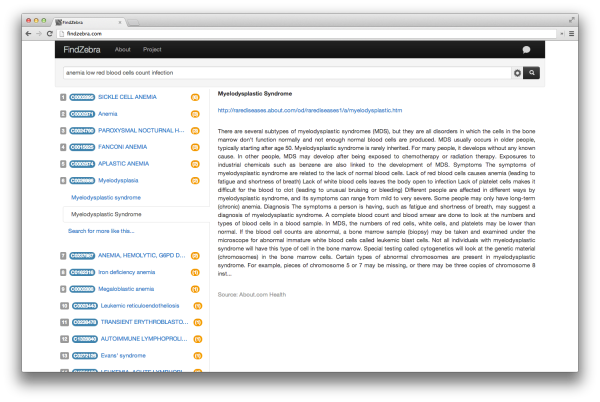Search Engine Designed By Denmark Researchers Helps Medics Diagnose Rare Diseases
Technical University of Denmark researchers have designed a search engine that indexes specific sets of databases to help identify rare diseases. Users can query patient symptoms on FindZebra.com which crawls over 31,000 medical articles focused on rare and genetic diseases to deliver medically relevant search results. While the search engine’s homepage includes a notification stating […]

While the search engine’s homepage includes a notification stating that the site is a research project and should only be used by medical professionals, the developers boast that it delivers significantly better results than Google when searching for rare disease content.
For a disease to be defined as rare in the U.S., it has to affect fewer than 200,000 Americans according to the National Organization for Rare Disorders. With such a limited amount of online content around rare diseases, finding information can be difficult using search engines like Google that rank results based on the number of relevant incoming links to a website. Radu Dragusin and the team of researchers who created FindZebra.com believe their search engine’s results are far superior when compared to search results using the same limited dataset via Google’s advanced search option.
“Our finding, that FindZebra outperforms Google overall for this task and especially when restricted to the sites of our own collection (Google Restricted), suggest that Google ranking algorithm is suboptimal for the task at hand,” said FindZebra.com’s creators. Indexing only a limited number of databases, including Online Mendelian Inheritance in Man, the Genetic and Rare Diseases Information Center, and Orphanet, FindZebra.com uses open source information retrieval tool Indri along with a standard search engine interface.
Named after a phrase coined by a University of Maryland School of Medicine professor to describe unexpected diagnoses (“When you hear hoofbeats behind you, don’t expect a zebra.”), FindZebra.com may be the answer to helping physicians correctly diagnose diseases that are often misdiagnosed, can take years to identify.
Opinions expressed in this article are those of the guest author and not necessarily Search Engine Land. Staff authors are listed here.
Related stories
